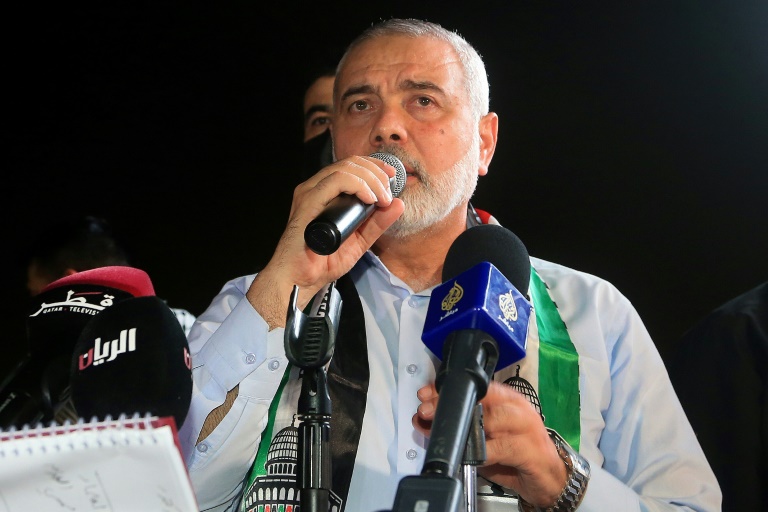Hamas Qatar office in spotlight as Gaza war intensifies

Hamas political bureau chief Ismail Haniyeh has long been based in the Qatari capital Doha, where he has met foreign diplomats and addressed pro-Palestinian demonstrations
Doha – The spiralling conflict in Gaza has put Qatar’s hosting of a Hamas office under close scrutiny and could force a re-evaluation of ties between the Gulf state and the Palestinian militants, analysts say.
Middle East analyst Andreas Krieg, who was based in Qatar between 2013 and 2016, said Doha, would have to “push back” in its relationship with Hamas.
“I think there is a realisation that something’s got to give in terms of that relationship, depending on what the USA administration are requesting,” Krieg said.
Hamas militants stormed into Israel from the Gaza Strip on October 7, killing at least 1,400 people and taking hostage some 200 more, according to Israeli officials.
In Gaza, more than 3,700 Palestinians have been killed in relentless Israeli bombardments in retaliation for the attacks, according to the latest toll from the Hamas-run health ministry.
Qatar has been engaged in intense diplomacy behind the scenes and has been linked to negotiations for a prisoner exchange between Israel and Hamas because of its open channels with the militant group.
But as Israel has pounded Gaza with the stated aim of obliterating Hamas, Qatar’s close ally the United States has looked to squeeze the Islamist group.
On Wednesday, Washington sanctioned 10 Hamas operatives it said had been involved in financing and facilitating Hamas in Gaza, Turkey and Algeria, including Ahmad ‘Abd Al-Dayim Nasrallah, a senior official based in Qatar.
– ‘Communication channel’ –
A Qatari official told AFP that Hamas’s political office was “opened in Qatar in 2012 in coordination with the United States government, following a US request to open a communication channel”.
“Hamas’s political office has frequently been used in key mediation efforts coordinated across multiple US administrations to stabilise the situation in Gaza and Israel,” the official added.
Following the same pattern, Qatar invited the Taliban to open a political office in Doha in 2013, with the blessing of then US president Barack Obama.
But during a visit to Qatar last week, US Secretary of State Antony Blinken warned the Gulf state about its close ties with Hamas, whose Doha office doubles as the main residence of its self-exiled leader Ismail Haniyeh.
“There can be no more business as usual with Hamas,” the top US diplomat said.
Qatar has provided financial aid to the Gaza Strip for years, which officials in Doha have said is “fully coordinated with Israel, the UN and the US”.
Qatar’s Prime Minister Mohammed bin Abdulrahman Al-Thani defended the Hamas office, saying it was a way “of communicating and bringing peace and calm to the region”.
But for Krieg, “in terms of optics, there has to be some sort of dissociation between Haniyeh and Qatar”.
He said Doha could potentially continue to host Hamas but it needed to establish “some sort of distance between the leadership of Hamas and Qatari policymakers”.
– ‘Prioritisation’ –
Qatar is home to the largest US military base in the Middle East and Washington backed the small but strategic Gulf state during a four-year blockade by its neighbours led by Saudi Arabia.
“I think this is a clear prioritisation of relationships for Qatar,” Middle East analyst Sanam Vakil said.
“Their relationship and investment in bilateral ties with Washington will supersede any other ties it has in the region.
“For Washington, it’s also worthwhile thinking that one of its partners has the ability to back-channel,” she added.
Vakil, the director of Chatham House’s Middle East programme, said she expected Qatar to “take some moves” to re-evaluate its association with Hamas and “over time distance itself from that relationship”.
“But it will require, and I think this is a key point, the international community and the US to have a plan to address Palestinian self-determination,” Vakil added.
The Hamas political bureau was set up in Qatar in the aftermath of the Arab Spring uprisings of 2011 amid US fears the Palestinian group might otherwise set up base in Iran or Lebanon, Krieg said.
Expelling Hamas leaders from Doha would create a similar situation now in which Western governments would “lose complete oversight and control over them”.
“Qatar has quite a lot of leverage,” Krieg said pointing to its role as a mediator with Iran in a prisoner exchange between Washington and Tehran last month.
He said the United States was “making sure the Qataris can speak to the Iranians and lay out what different operative options are and making sure this doesn’t blow up completely”.
